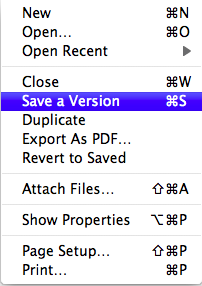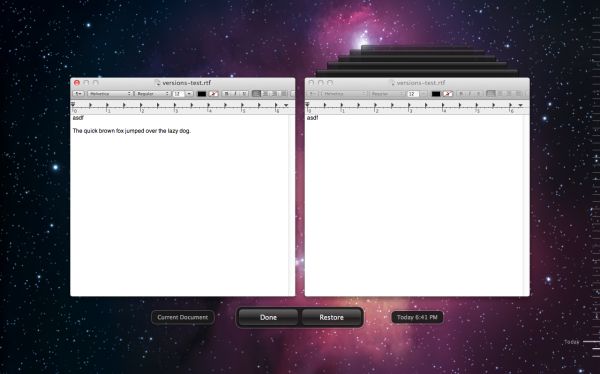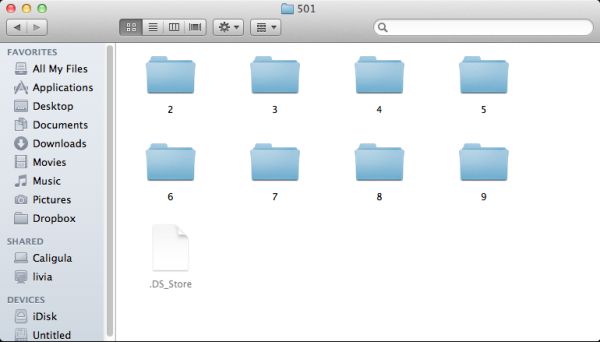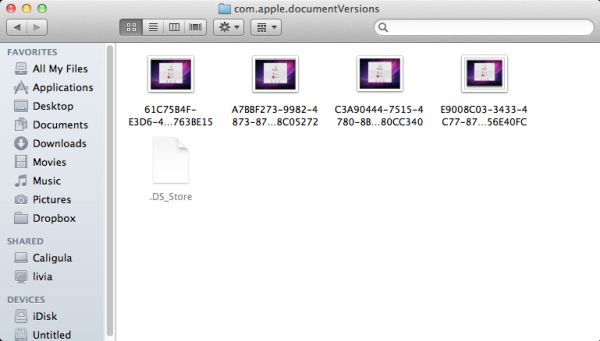Back to the Mac: OS X 10.7 Lion Review
by Andrew Cunningham, Kristian Vättö & Anand Lal Shimpi on July 20, 2011 8:30 AM ESTAnother heavily-publicized feature of Lion is Versions, which keeps older copies of files as you save new ones and allows you to go back to previous copies to compare, restore, and copy-paste things you didn't mean to change. Unlike Resume, applications will need to be changed to support this functionality.
In a Versions-supporting program like TextEdit or Preview, you'll notice that the normal "Save" or command-S function is now called "Save a Version" instead. There's no special command you need to know to save Versions - if the app supports it, this happens automatically.

When you want to go back and look at your previous versions, select the Revert to Saved option in the menu to open the Versions interface.
You'll be presented with a very Time Machine-esque interface that will let you browse through your previously saved copies, compare them to your working copy, and restore an old copy to be your new working copy.
So how does this work? Versions stores its data at the root of your OS volume in a hidden and locked-down folder called 'DocumentRevisions-V100". Files are saved using the UID for each user account (the UID is a unique number assigned to each user account at time of creation, and is normally hidden from the user. All UNIX and UNIX-like operating systems use UIDs for user accounts). In the screenshot below, "501" is my account's UID, and the numbered folders each correspond to an individual file.
Drill down into any of the folders stored here, and you can see where OS X is keeping the older copies of your files.
Whenever you delete the source file, all stored versions of it are also deleted, so don't try to use Versions to recover accidentally deleted files - that's not what it's for, and you'll still need to be careful about what you do and don't keep.
It's not immediately obvious how many files OS X will store versions for, or how much disk space this hidden folder will take up if you let it, but disk space seems to be the limitation here - I was able to save 63 versions of an individual file without overwriting any older copies. Given Apple's desire to hide the seams and inner workings of OS X from regular users, I feel confident in saying that (1) OS X won't allow this system folder to take up so much space that it impacts OS performance or storage of regular files, and (2) there's probably some sort of safeguard present that will eventually begin deleting older versions of things as disk space runs low. This is how Time Machine works, and Versions is obviously taking cues from that feature.













106 Comments
View All Comments
steven75 - Friday, July 22, 2011 - link
"The fact is Windows/Office is really only expensive if you are building your own computers and installing your own OS"You seem to be implying that Office comes free with a pre-built computer when it in fact doesn't ever.
anactoraaron - Sunday, July 24, 2011 - link
wrong. I know I shouldn't feed the trolls but when office 2010 came out my local office depot (and likely every office depot) had at least one pc with the full version of office 2010 on it. It was some kind of promotion they ran for about 2 weeks.tipoo - Wednesday, July 20, 2011 - link
Apart from the new animations in Safari, is performance improved any? Any word of it getting GPU acceleration?name99 - Thursday, July 21, 2011 - link
My experience was that it ran the IE Paintball demo 25% faster, and the end result showed no visual artifacts. So, an improvement on 5.0, but still nothing like the HW acceleration performance of IE.On the other hand, I've yet to encounter a site (apart from the IE demos) where this actually matters...
name99 - Thursday, July 21, 2011 - link
Oh, it also, if you care, has elementary support for MathML. To be honest, however, the support is REALLY limited. The typography looks like crap, and anything even slightly fancy looks even worse --- eg long bars over symbols, large surds, etc.tipoo - Friday, July 22, 2011 - link
Thanks. Yeah, its GPU acceleration doesn't seem as expansive still as other browsers, judging by canned benchmarks I've run it through. IE9 and FF5 are still far ahead in GPU acceleration, Chrome and Opera are getting there, Safari 5.1 is still last.EnzoFX - Wednesday, July 20, 2011 - link
I think it's pretty unfair to compare Windows full-screening to Lion's. Full screening in Windows is not a feature at all IMO, it is the equivalent of dragging the window size out to the size of the screen. You do not gain any functionality whatsoever (usually just a lot of empty space, which was never in Apple's radar before). This kind of full-screen functionality has been present in OS X long before Lion, though it was often more manual, having to drag the window size out.But as you say, Apple has added functionality and it's become it's own separate feature. I think the comparison is pointless.
SmCaudata - Wednesday, July 20, 2011 - link
True full-screen in Windows only happens with games, certain video players, and select other apps. I personally so no use for full-screen for most computer applications.Also, the comparison is valid because even in those areas where Windows does use full-screen, the other display still works. I can have a full-screen movie on one monitor while I do whatever I want on the other.
I really fail to see how Apple's implementation has "added functionality" that didn't exist in other OSes before. The article talks about using gestures instead of minimization... isn't that what Alt+Tab and Win+tab already did?
There are certain things that Apple does do well. Their dock was something that MS obviously took inspiration from for W7. This implementation of full-screen seemed pretty limited IMO.
name99 - Thursday, July 21, 2011 - link
I suspect that the multi-screen hiccups with full-screen are purely temporary.We have seen problems like this before --- for example when multi-user GUI support (the rotating cube thing, to allow new users to log in to a mac) was first added, it didn't take long to discover that various iLife apps didn't behave properly. (I forget the details, but I think both iTunes and iPhoto wouldn't launch for the new user.)
It's one of the drawbacks of Apple being so secretive, even internally, that you get these sorts of crossed signals. But the issues usually get fixed, and if they are very visible, they usually get fixed soon.
I'd say, right now, the appropriate response is to assume this is a screwup, not go into conspiracy theory mode about how this is a plot by Apple to eventually remove multi-screen support.
Uritziel - Friday, July 22, 2011 - link
LOL. As if a company spearheading Thunderbolt would aim to remove multi-screen support.